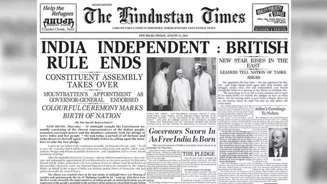No, it wasn't random!
August 15 is our Independence Day, and it's a date we never forget, even if we forget our own birthday. But have you ever wondered
why August 15? Why not any other day in the year? Surely, there must be a reason behind choosing this specific date. Well, there is. And it’s more interesting than you might think. Today, as we celebrate India’s 79th Independence Day, let’s turn the pages of history and learn the story.
First, the History - The Fraying Empire and India’s Restless Heart
By the early 1940s, the British Empire was fraying at the edges. World War II had pulled it into economic and military quicksand, and the jewel in its crown, India, was becoming ungovernable. The Quit India Movement, launched in 1942, had shaken the colonial foundation. Even though it was quickly and violently repressed, the message was clear that Indians would no longer wait patiently for freedom.
Censorship, arrests, and curfews couldn’t smother the discontent. Then, in 1945, came a political earthquake in London. Winston Churchill, who had little patience for decolonization, was ousted. Clement Attlee’s Labour Party swept into power with a more pragmatic and economically desperate vision.
The empire could no longer afford the burden of its colonies. Especially not India, where communal tensions had begun to crack the surface. And a transfer of power was an imperative.
Lord Mountbatten and the Deadline That Wasn’t
In March 1947, Britain sent one of its most well-connected men to manage the exit: Lord Louis Mountbatten. Naval commander, cousin to King George VI, and a man with with reputation, Mountbatten arrived as a choreographer of Britain’s final act in India.
He was given until June 30, 1948, to complete the transfer of power. But when he landed in Delhi, the mood was already febrile. Riots between Hindus and Muslims had begun to engulf cities, especially in Punjab and Bengal. The demand for Pakistan, led by Muhammad Ali Jinnah and the Muslim League, had hardened.
Mountbatten, to his credit or conceit, realised that time was a luxury no one could afford. He cut the timeline short, and India's independence would come not in a year, but in five months. August 1947.
But how did the 15th become the chosen day? In Freedom at Midnight, the writers Dominique Lapierre and Larry Collins recount Mountbatten’s own words: “The date I chose came out of the blue... I was determined to show I was master of the whole event... I thought it had to be about the 15th of August. Why? Because it was the second anniversary of the Japanese surrender.”
#Throwback to when India's last Viceroy, Lord Louis Mountbatten, addressed the crowd during the nation’s very first Independence Day celebration at the #TajMahalPalace, Mumbai on the midnight of 14-15 August, 1947. #JourneyToFreedom #ThisDayThatYear #IndependenceDayIndia pic.twitter.com/lSBQCzNc4q
— Tata Group (@TataCompanies) August 14, 2018
(Credit: Tata Group)
In other words, the date wasn’t selected with Indian history in mind. It was chosen to reflect a victory in a very different war.
August 15, 1947, and a Nation Born
To understand Mountbatten’s choice, you have to look eastward, toward another theatre of war. On August 15, 1945, the Japanese Emperor Hirohito announced Japan’s surrender in a radio broadcast, a moment that marked the end of World War II. It was the first time the Japanese public had ever heard their emperor’s voice. The Allies, drained by years of carnage, greeted it as a day of peace.
For Mountbatten, who had served as Supreme Allied Commander of the South-East Asia Command, it was also a personal triumph. Choosing the same date for India’s independence was, consciously or not, his way of inscribing that earlier victory onto his final imperial assignment.
15 August 1947 :: Tiranga at Red Fort . India's First Independence Day
— indianhistorypics (@IndiaHistorypic) August 15, 2015
(Photo- Homai Vyarawalla ) pic.twitter.com/iGehMwbrdx
(Credit: indianhistorypics)
A Freedom Divided
But freedom came with a knife-edge. On June 3, 1947, just weeks before independence, Mountbatten unveiled what came to be known as the Partition Plan, the decision to divide British India into two nations: India and Pakistan. And what followed was chaos. Borders were redrawn with bewildering speed, and communities were torn apart overnight.
The bloodshed that ensued was staggering. In one of history’s largest mass migrations, over 15 million people were displaced. Communal violence claimed nearly a million lives. Trains packed with refugees arrived at stations carrying not hope, but corpses.
It’s worth pausing to consider that the date that marked freedom for one nation also marked rupture and loss for millions.
Midnight, and the World Changed
When the clock struck twelve on the night of August 15, the Constituent Assembly gathered in Delhi. Lord Mountbatten, in ceremonial uniform, prepared to hand over the reins. And Jawaharlal Nehru, in a voice quivering with history, delivered the words that generations would remember: “At the stroke of the midnight hour, when the world sleeps, India will awake to life and freedom…”
And for the first time in over two centuries, India woke to a dawn that it could call its own.
Happy Independence Day!













